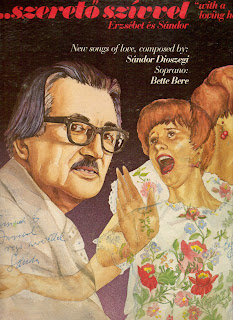 |
| ...Szeretö Szívvel: Erzsébet és Sándor Sándor Dioszegi with Bette Bere et al. LMPS—2, Made in USA, 1979(?) |
I've really now settled in into the "a-post-every-Sunday-morning" routine. This now is week #52 and that means I've been at it exactly one year. The 52 different LPs I tackled in a year provide a good sampling of the music I've bought in the South Florida thrift stores, but there are too many skipped genres to be a perfect sampling. Just a few days ago for example, I picked up a copy of The Modern Dance by Pere Ubu—easily one of the best finds of the year—but not quite the record I tend to pay attention to in the context of this blog. There are not really any criteria for selection but I do shy away from those records that are too familiar or too much part of the "official" canon of recorded music. More than half of the (estimated) 500 records I bought at thrift stores the past 52 weeks were bought at one of the many on Tamiami Trail. That street might well be the most densely populated—in terms of thrift stores in proportion to the number of buildings—in the country (probably a grave exaggeration, but just to illustrate my point). Tamiami Trail is known under various guises, in my hometown of Fort Myers the names Cleveland Avenue, Route 41, and Tamiami Trail all refer to the very same street. The name is not an exotic Native American name but a mingling of Tampa and Miami, between which two cities the street runs. I've not explored the full length of the street and I will certainly come across many more great stores in the months to come. ...Szeretö Szívvel (with a loving heart) I picked up at the very same thrift store on Tamiami Trail in Charlotte Harbor as Folk Music from Lőrincréve I wrote about last week. Keeps the Hungarian theme going for another week. This record was not produced in Hungary but in the US though, as performers are first and second generation Hungarian immigrants. And unlike last week's this one is not of folk songs but of so-called art songs. Side one has classical love songs while side two consists of chansons, musicals, and dance tunes. My pick to share this week comes from side B and is called Esti vallomás (Confession of love by twilight—poem by Erzsébet Kutas).
A curious aspect of this record is that there is no record label, not an indication where and when it was printed either, which probably means that it is somebody's private enterprise. What the record does have, and goes into my nice collection of it, is a signature of the composer on its sleeve. The musicians are credited on record: all songs by soprano Bette Bere accompanied by the composer Sándor Diosszegi on piano. The artist who made the watercolor that adorns the sleeve is also named: Csaba Zongor. The watercolor is signed Csaba 79 which gave me an indication as to how to date this record. It's not my favorite sleeve ever but hey...




